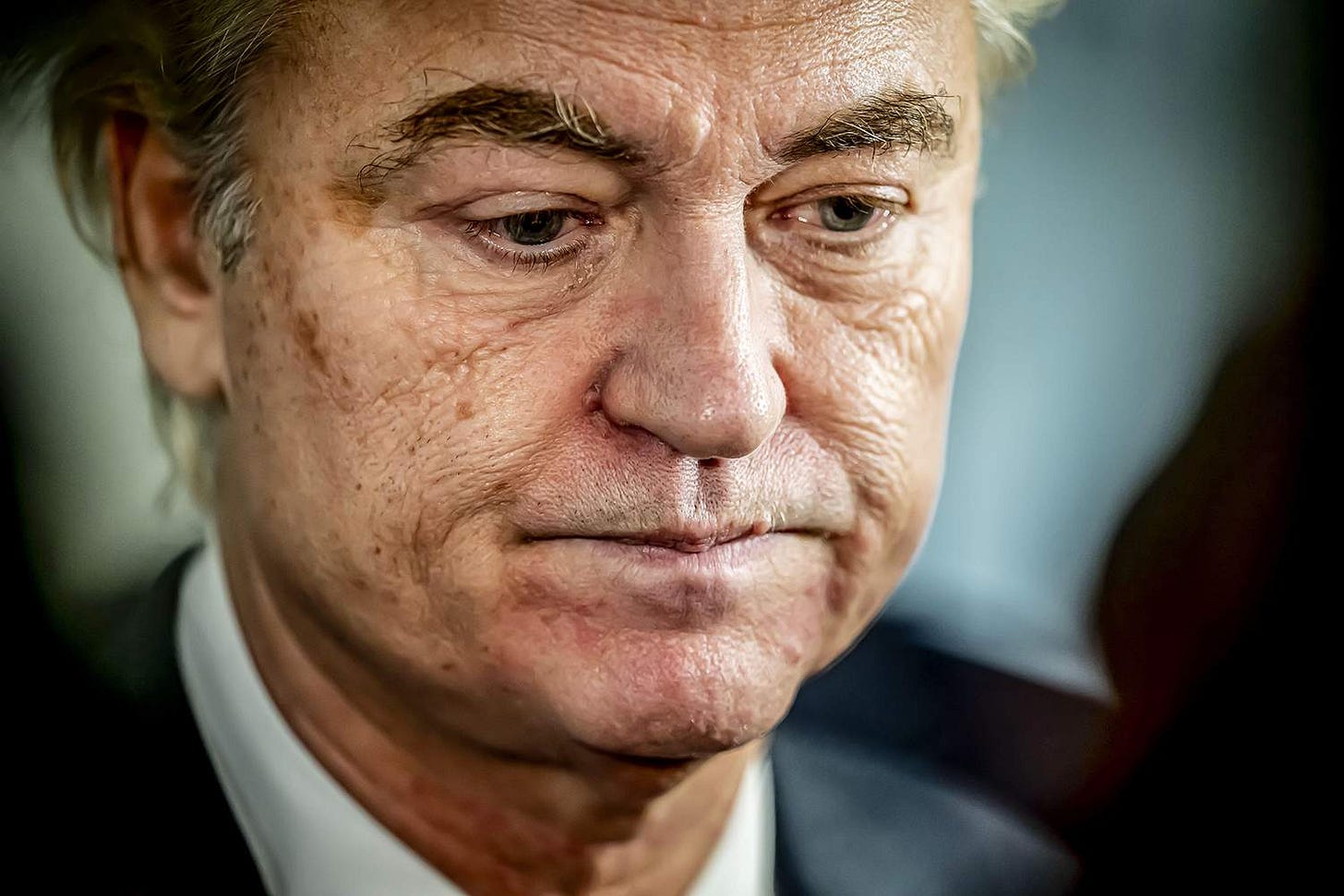‘Geert Wilders’ Far-Right Retreat Leaves a Very Dutch Political Mess’
The advance of centrist parties in the Dutch elections will not be enough to produce a new stable governing coalition, argues Chris Keulemans

Geert Wilders’ PVV may have lost ground in this week’s Dutch parliamentary elections, but the truth is that, contrary to all the talk in the international media, this modest European nation has not suddenly discovered how to defeat the extreme right.
In reality, these elections merely confirm that politics in the Netherlands remains inward-looking, hostile to strangers and politically clueless.
It’s fair to say that Wilders himself may be nearing his expiration date. But his one-man party, with its backbenchers recently exposed for fabricating widely-circulated AI images of brown-skinned men harassing a young blond woman and left-wing leader Frans Timmermans being led away in chains by the police, still managed to secure 26 seats in parliament, their second best score ever.
Combined with the like-minded parties JA21, BBB and FvD (whose new leader seriously considers that the Aboriginals might have discovered fire just 50 years ago), the extreme right still command 46 seats in parliament, out of a total of 150, just two down from the previous elections. This means that roughly one-third of Parliament and their voters continue to demand the ‘remigration’ (slash: deportation) of citizens with non-western roots.
Compared to these, the Dutch centrist liberal Democrats 66, whose leader and possible new Prime Minister, Rob Jetten, looks like a beacon of reason. The only problem is that over the past decades, D66 representatives taking part in governments, national and local, have barely developed any real distinctive policy. They are like that guy who always shows up at parties: perfectly agreeable, but no one knows who invited him, and when you ask him what he would prefer, beer, wine or juice, he’ll just smile and say: sure!
Before this election, D66 was regarded as being slightly left of centre due to their position on issues like trans rights, although they are often hard to pin down.
However, during the campaign Jetten shifted course somewhat, forgetting about his green goals, changing his mind about refugees (who he said should now only apply at the European borders, and not on our soil) and was welcomed by a sea of Dutch flags on his triumphant election night. In short, it’s impossible to predict exactly which direction Jetten wants to take this country.
He will need his apparent optimism once he starts building a ruling coalition, however. In a parliament with 15 political parties and no clear majority, any Government will always have to be a coalition. That’s why the result would have been largely the same had Wilders’ PVV won the elections. Wilders would then have spent two weeks or months trying to get others aboard, but all the large parties have ruled out stepping into a coalition with him, after he spent a year sabotaging his own Government before deserting it in June.
Once Wilders gave up, it would be the turn of Jetten’s D66, as it will be now. And his only option to build a majority coalition is to gather the four traditional parties left and right of centre.
This would be the equivalent of a new UK Government consisting of Labour, Conservatives and Liberal Democrats – obliged to join forces in order to keep Reform out of power. It would bring together parties who all have their old suspicions and animosities towards each other, on top of their irreconcilable political differences. Just take Gaza, which was barely mentioned during the campaign, one of the reasons why so many voters didn’t show up at all. VVD is a strong supporter of the Netanyahu government, CDA deeply believes that Judeo-Christian culture built Europe, GroenLinks-PvdA has chosen to cease all arms trade with Israel – and D66, well, it would welcome a cease-fire.
That is, until you read the statement on their website – and this a literal translation: “The sanctioning of the Netanyahu government must be sanctioned and settlers.” Yes, that may be a mistake. But this gibberish is actually there, in a statement by the largest political party in the Netherlands, on the most explosive topic of today.
This coalition will be impossible to form. It will also be impossible to form another coalition that wouldn’t implode within months. In the meantime, the caretaker Government, chaired by party-less former civil servant Dick Schoof, consists of two of the original parties. (PVV quit, soon followed by NSC, who paid last night by losing all of their 20 seats in parliament.)
Together, the two remaining parties represent 26 seats, a minority of one-sixth. They may well be continuing their task deep into the next year, while the cabinet negotiations drag on.
On the bright side: no longer will every parliamentary debate somehow end up being about asylum seekers, as was the case under Wilders.
This might create more space to discuss more urgent matters such as the need for 400,000 new affordable houses (on a population of 18 million), the climate goals that have faded from view, the healthcare that is rapidly becoming expensive and unaccessible, the growing number of people living in poverty, and the fact that the Netherlands are actually part of Europe and the world.
For over a year, Geert Wilders and the Government he orchestrated managed to keep all of these issues off the table. Rob Jetten, assuming that he will actually succeed in forming a Government, might not be enjoying himself for much longer.

